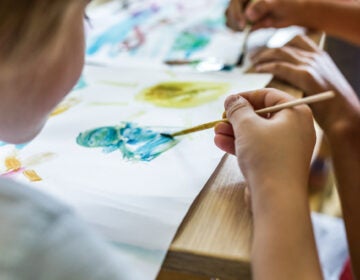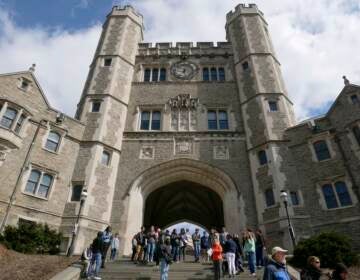West Chester University DNA-testing project aims to open door to racial discussions

West Chester University professor Anita Foeman (top left) created the project, and student Daniel Schwartzman (standing second from left) is waiting for his DNA results. (Photo by Bob Laramie)
Researchers at West Chester University have great expectations for a little expectoration.
A new project at the university is using DNA testing of saliva to foster discussions about race — by using ethnicity and ancestry results.
Project founder and communications studies professor Anita Foeman said DNA testing helps break down “silos of race” and the tendency people have of defining themselves with just one racial background.
“The idea of this is that if we can create this moment where people see that their backgrounds are so much different than they thought, it creates an opportunity for dialogue across these lines,” she said.
And “One University, One Ancestry” gives participants a new approach to the topic of diversity, Foeman said.
“There is so much divisiveness out in the world around race and difference that we just feel this is a really positive way to talk about how we’re different, how we’re the same,” she said.
More than 150 kits have already been claimed for the project that started last week at the university in Chester County and offers testing to university students, employees, alumni and community members.
After participants are asked what they think their background is, they take the DNA test. They get their results four weeks later, then discuss the sometimes startling revelations.
“Many times, when people actually get the results, and they’re very different, they start to talk to their families, look at history books, ask more about biology,” said Foeman. “Many things that have been in the history or sociology books about people passing as a different race, or marginalized groups, all of those things start to become very personal and real.”
Junior Kaitlin Clark, who identifies as white and black, was surprised by her results.
“I never thought in a million years I’d have Asian, Hispanic, or even Middle Eastern in me, so I was really surprised,” she said. “I called my mom and dad right away and told them everything. They were really surprised too. They thought it was really cool.”
The 20-year-old communications studies major said it’s made her more open and interested in other cultures.
“I’ve found myself telling other people, ‘You really shouldn’t make any judgments on anybody because for all you know you could very well be part of that culture or that race and not even know,'” she said.
The South Jersey native, an orientation leader for new students at West Chester, said she will be using her DNA results as an opportunity to talk to incoming freshman about getting outside of their comfort zones to interact with other students they typically wouldn’t.
Senior Daniel Schwartzman is 100 percent sure he’s Haitian — but he’s still waiting for the DNA confirmation.
“If it turns out I’m not Haitian, if it turns out that I’m from Sweden, then I don’t know. I may need to take some time to re-evaluate my life,” he said, laughing.
The Upper Darby native is looking forward to finding out where in Africa his Caribbean ancestors originated.
“I’m really excited. It’s cool because I am adopted,” the 22-year-old said. “I’ve been able to connect to my culture, but I don’t know family history. I don’t know where my birth family came from. It could be endless possibilities, or else come out I’m Haitian and I’ll still be happy.”
The project grew out of the DNA Discussion Project, which Foeman started in 2006 with the help of a WCU Multicultural Faculty Commission grant to DNA test some of her classes. More than 700 individuals have participated since then.
Researchers have found most test-takers overestimate European ethnicity and underestimate Asian ancestry.
And many thought — erroneously — that they had a trace of Native American blood.
“People who would think they had Native American would really be whites having black ancestors and blacks having white ancestors, which is much more the narrative of slavery and the contact between blacks and whites,” said Foeman. “It just really puts in your face some of the conversations that people have covered over by narratives that weren’t connected to reality.”
Testing will continue throughout the fall, with discussion sessions planned in the spring.
“The goal of this is to get people to really reimagine race and to talk about it in ways that help us start to develop narratives that are transformative,” Foeman said.
Student DNA testing is grant-funded, while other participants are asked to cover the $120 DNA test.
WHYY is your source for fact-based, in-depth journalism and information. As a nonprofit organization, we rely on financial support from readers like you. Please give today.




